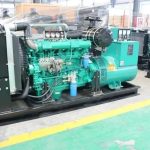Introduction
In today's modern world, access to electricity is essential for various aspects of life, such as communication, healthcare, education, and economic development. However, many remote locations around the world lack access to reliable grid power due to their isolated nature or challenging terrain. In such cases, diesel generators play a crucial role in providing a dependable power supply for these remote areas. This article explores the significance of diesel generators in powering remote locations, their benefits, applications, and considerations for their use.

Importance of Diesel Generators for Remote Power Supply
Diesel generators are widely used in remote locations for several reasons. One of the primary advantages of diesel generators is their reliability and durability, making them suitable for continuous operation in harsh environments. Unlike renewable energy sources like solar or wind power, diesel generators can provide power consistently regardless of weather conditions, making them ideal for remote areas with limited access to grid power.
Additionally, diesel generators are versatile and can be easily transported to remote locations, making them a practical solution for temporary power needs such as construction sites, disaster relief efforts, or events in remote areas. Their portability and ease of installation make diesel generators a popular choice for powering remote locations where grid connection is not feasible or cost-effective.
Benefits of Diesel Generators for Remote Power Supply
1. Reliability: Diesel generators are known for their reliability and can provide a continuous power supply even in the most challenging conditions. This reliability is crucial for remote locations where power outages can have serious consequences.
2. Fuel Efficiency: Diesel generators are more fuel-efficient compared to gasoline generators, making them a cost-effective option for long-term power supply in remote areas. The efficiency of diesel generators also helps in reducing overall operational costs.
3. Low Maintenance: Diesel generators require minimal maintenance compared to other types of power generation systems, making them an attractive option for remote locations with limited access to technical support.
4. Long Lifespan: Diesel generators have a longer lifespan compared to other types of generators, providing a reliable power supply for extended periods in remote locations.
Applications of Diesel Generators in Remote Locations
1. Off-Grid Communities: Diesel generators are commonly used in off-grid communities where grid power is unavailable or unreliable. These generators provide essential power for lighting, heating, cooking, and other basic needs of the community.
2. Mining Operations: Remote mining sites often rely on diesel generators to power heavy machinery, lighting, and other equipment essential for mining operations. Diesel generators are preferred for their reliability and ability to provide continuous power in remote locations.
3. Telecommunication Towers: Diesel generators are used to power telecommunication towers in remote areas where grid power is unavailable. https://www.lkpowerplant.com/400kw/ ensure uninterrupted communication services for remote communities.
4. Military Bases: Military bases located in remote areas rely on diesel generators for their power needs, including lighting, heating, communication systems, and other essential equipment.
Considerations for Using Diesel Generators in Remote Locations
While diesel generators offer numerous benefits for powering remote locations, there are several considerations to keep in mind when using them:
1. Fuel Supply: Ensuring a reliable fuel supply is essential for the continuous operation of diesel generators in remote areas. Proper fuel storage and management practices are crucial to prevent fuel shortages.
2. Maintenance: Regular maintenance of diesel generators is necessary to ensure optimal performance and prevent breakdowns. Remote locations may have limited access to technical support, so it is essential to have a maintenance plan in place.
3. Environmental Impact: Diesel generators produce emissions that can have environmental impacts, such as air pollution and greenhouse gas emissions. Implementing emission control measures and using cleaner fuel options can help mitigate these impacts.
4. Noise Pollution: Diesel generators can be noisy, especially in quiet remote locations. Proper placement and soundproofing measures can help reduce noise pollution and minimize disturbances to the surrounding environment.
Conclusion
Diesel generators play a vital role in providing reliable power supply to remote locations where grid power is unavailable or unreliable. Their reliability, fuel efficiency, low maintenance requirements, and long lifespan make them an ideal choice for powering off-grid communities, mining operations, telecommunication towers, military bases, and other remote facilities. However, careful consideration of fuel supply, maintenance, environmental impact, and noise pollution is essential when using diesel generators in remote locations. By addressing these considerations and leveraging the benefits of diesel generators, remote areas can enjoy a consistent and dependable power supply for their essential needs.
